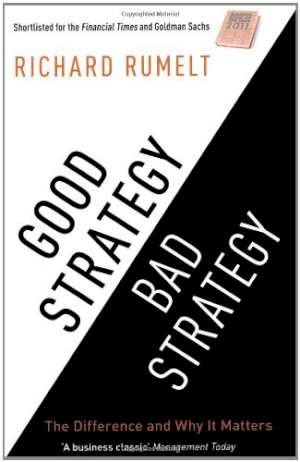29 April 2013
Good Strategy; Bad Strategy
The Difference and why it Matters
Richard R Rumelt
2012, Profile Books, 336 pages, £9.99
ISBN 9781846684814
Reviewer: Rebecca Harding

How do you steer a complex organisation to success in a complex world? According to Richard Rumelt the answer is breathtakingly simple: use good strategy and not bad strategy. While this may seem a statement of the blindingly obvious, we ignore the profundity of it at our peril. Good strategy is about how an organisation moves forward; it is a path-selector based on clear data and clear thinking. Bad strategy in contrast is the myriad obfuscation, goal-setting and failure to identify or face business obstacles. The road to performance hell, it seems, is paved with good intentions.
Good strategy, argues Rumelt, has been lost over the decades covered by this book in the confusion of terminology. Everything has been given a strategy label and strategy itself is conflated with goal-setting, success and ambition. His central contention is that this confuses the real purpose of strategy, which is to identify challenges and build actions and resources around meeting those challenges. It is the hard work that “honestly acknowledges the challenges being faced and provides an approach to overcome them.” It is not the organisation’s goals; it is not the organisation’s approach to innovation and marketing; it is not the organisation’s vision or values; it is not the organisation’s leaders or their determination to succeed. These are all necessary parts of good strategy, which, ultimately, is about diagnosing obstacles, using logic to create coherence and coordination across business functions and allocating resources and actions to solve business problems.
Bad strategy is not the reverse of good strategy. It derives from four things: Fluff, “the superficial re-statement of the obvious”; failure to face challenges; mistaking goals for strategy; misaligned objectives that fail to address critical issues or are themselves impractical. It flourishes because it is not connected with the scientific and objective approach that business leaders need logically to identify challenges and to find routes and commit resources and actions to address them. In essence, it is the “active avoidance” of the “craft” of good strategy because it is confused, skips detail and ignores choice and focus. More than this, it will commonly try to accommodate conflicting demands and interests.
The book is built on more than three decades of consultancy, practice and research. It is constructed using cases, not just from business but also from military, historical and government contexts which provide texture and depth to what is ultimately a black-and-white message: identify your problem, work out why you have that problem, find a way of dealing with it and commit resources accordingly. The fact that the book opens with Lord Nelson at the Battle of Trafalgar speaks for itself - the author takes a military and scientific approach to strategy. All complexity can be reduced down to the information received from careful scrutiny of data and application of logic. As the author suggests, “New strategy is a hypothesis and its implementation is an experiment,” or an “educated prediction of how the world works ….. Science is a method and not an outcome and the basic method of good business people is intense attention to data and what works.”
Anyone with a background in organisational behaviour, will be riled by the apparently clinical approach that this suggests. The last 20 years of research in human resource management and organisational learning is not covered and there is only perfunctory reference to accumulated and proprietorial knowledge that accrues specifically to one organisation as a source of competitive advantage. Rumelt might reply: learning is not strategy. Leaders need to use their heads and keep their heads - learning is a necessary but not sufficient basis for clear thinking. Good strategy grows out of an independent and careful assessment of the situation. Being blinded by complexity is an obstacle to logic and therefore an obstacle to good strategy.
